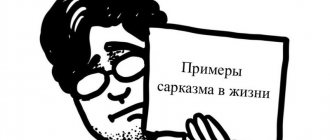Not a single living creature on the planet has achieved such “success” in self-destruction as man. Today, most people methodically and purposefully dig their own grave: some with a spoon, some with a glass, some with a computer mouse, spending day and night in the virtual reality of computer games.
And self-destructive forms of behavior have become so familiar to us that it is already considered the norm. And for a healthy lifestyle you need good reasons, at least a serious illness that simply does not allow you to continue to engage in self-destruction. It gets ridiculous: in order to give up alcohol or meat, you need to find an “excuse” for others - for what reason a person no longer intends to destroy himself. And sometimes it’s easier for a person to say that illness does not allow him to further destroy himself than to hear that he “fell into a sect.”
And there are a huge number of methods of self-destruction that are perceived as the norm in society today. Unfortunately, some of them remain popular even among those who lead a healthy lifestyle. One of these phenomena is swearing or swear words.
Even among spiritual practitioners, there is a certain layer of people who adhere to the theory that swearing is an original Russian phenomenon, these are words that carry powerful energy, and with them one can, as they say, “push through reality.” Such people usually give some completely wild examples that, they say, at a construction site or in the army you can’t do without swearing at all, they say, swearing is almost a tool for creation under certain conditions. However, it is as old as time. If a person has any bad habit, in most cases it is much easier for him to subsume an entire philosophical concept under this habit than to simply make an effort and overcome his limitation.
However, there is some truth in this theory. Swear words actually carry powerful energy, but this is energy that destroys us. An atomic bomb is also powerful energy, but, presumably, there are few people who want this bomb to whistle over their city. The situation with swear words is approximately the same: it is powerful energy, but it is designed to destroy our body and psyche.
People swear to be like everyone else
This is the most common reason. And it is widespread primarily among guys.
Once I was listening to a lecture on psychology, and the lecturer described the following situation. Imagine a teenage child studying at school. He studies well, behaves civilly, speaks politely with teachers. Everyone says about him: “What a good boy!”
And this child leaves school after school. He goes home and sees a crowd of hooligans coming towards him. As soon as he notices them, he immediately begins to spit, swear, and behave cheekily. Not a trace remained of the former “good boy”.
Why does this happen? What does the student want to say with this behavior to those hooligans who come towards him?
“Don't hit me. I'm just like you. Why do you need to beat me?
Another situation. Imagine that a conscript soldier is transferred from one unit to another for some reason. This other part is an already formed team, where it is customary to swear. The soldier finds himself in this new team and sees that everyone uses obscenities in their speech. If he doesn't swear, he will immediately attract attention. They can even “check” him: “Come on, say “...”.” Don't you swear? Cultural or what?”
So it turns out: either oppose yourself to the entire new team, become a “black sheep” in society, or become like everyone else. That is, start speaking the language that all other participants in society speak.
Why you can’t swear or the power of Russian swearing
At the same time, everyone knew by default how powerful these words were and how extremely carefully this power should be handled. Swear words were used only in extreme situations and were equated to what is called “the last bullet.”
When, on a long hike, someone literally fell exhausted, and leaving him with the others meant his inevitable death, he was literally cursed.
The state of shock that was experienced at the same time was like an electrical discharge in intensive care, some exorbitant reserves in the body were turned on, and the person, in a completely incredible way, got to a safe place in formation.
People swear to be higher in the social hierarchy
Let's assume that there is a conditional class where children do not swear. Well, let’s say that such a class exists.
A new student enters the class. He notices that none of the children around use mats. And he starts swearing. Not in front of the teachers, of course, but during recess or when everyone is going home after school. In general, he finds time for this.
For what? To assert yourself. Swearing in our “proper” class is something forbidden. And the new kid wants to show the children around him: “Look, you can’t, but I can!” I’m not afraid of anything, I’m cooler than all of you!”
The influence of swearing on a person’s life
In addition, swearing has a destructive effect on our lives. After all, many of us believe that words and thoughts are material. That is, we successfully attract everything that we say and think about into our lives.
And indeed it is.
This is confirmed by examples of successful, happy and rich people. The main secret of success for most of them is correct positive thinking and kind words.
The more we focus our attention on something negative, complain, quarrel, get angry, argue and get irritated, the more negativity we receive into our lives.
The basis of swearing is fear
Two of the three reasons that I described above boil down to one thing - fear. A person swears because he is afraid. Afraid of loneliness. He is afraid of being rejected, of not realizing his ambitions, of remaining an outcast forever.
By using swear words in speech, a man or woman is trying to “win back” their place in society and show their strength.
Paying attention
In this article I am not considering situations where a person uses obscenities to insult another. I'm talking about situations where obscene language becomes part of a person's everyday vocabulary. With insults, everything is clear and transparent.
WHICH NEURONS ARE “RESPONSIBLE” FOR STORING
We all know that human speech is not a completely controlled process, especially emotional speech.
In recent years, scientists have been exploring the neural mechanisms of foul language by studying the brains of patients with Tourette syndrome.
Tourette syndrome is a rare neurological disorder of unknown origin, characterized by nervous tics, grimacing, and involuntary shouting of obscenities. Such painful, irresistible swearing was called “coprolalia” (from the Greek “kopros” - feces, dirt and “lalia” - speech).
Why are we drawn to “forbidden” swearing and why is swearing generally “forbidden”
Indeed, why is swearing “taboo”? And why are some of us so drawn to this “forbidden” fruit?
To answer this question, let's go back many, many centuries.
In terms of human evolution, swearing was progress, not regression. People realized that in order to take revenge on the offender, there is no need to shed blood. You can just say the word.
And the question arose about what words to say. What words can hurt another person to the heart.
For any ancient tribe, family feelings and blood ties were very important. And the worst insult that could be inflicted on a man or woman is to talk about an intimate relationship with the person closest to him or her - his mother.
Hence this category - “swearing” words.
Why are there such negative attitudes towards them in intellectual and cultural circles? Because these are the most disgusting words that exist in the language. These are words that were created to insult a person's most precious possession.
Unfortunately, few people know about this “backstory” and few people talk about it. And children, teenagers, and then older boys and girls think that swearing is just something forbidden and therefore interesting. The Forbidden fruit is sweet.
What is checkmate
According to Emma Byrne, expert and author of the book “It's Good to Swear,” it's not easy to define swearing, as it is completely different in different communities or different countries. What is obscenity in one country may be a completely harmless word in another. They have only one common characteristic feature - all swear words relate to topics that are indecent to discuss in society, and therefore they are taboo. Only in this case the words receive emotional reinforcement.
Different countries and societies may have taboos on different topics. Therefore, in one culture, parts of the body are offensive, in another, diseases, in a third, certain functions of the body.
In Spanish, swear words are not individual words, but entire sentences or even swear stories. Therefore, Spanish swearing is considered the most creative. In Malta, the worst swear word is translated as “sperm”. In Chinese, one of the mats means “turtle egg.” This slur originates from the belief that female turtles are extremely unfaithful to the males with whom they live. Therefore, to call someone a turtle egg is to doubt that he is the biological son of his father.
In different cultures, swear words can have different meanings, but they always relate to forbidden topics that are not customary to discuss in society
In Russia, swearing is a whole culture. The well-known joke that we don’t swear, but speak it as usual, has some truth. Almost every word can be either abusive or approving or even expressing admiration.
In order not to miss the latest news from the world of science, fascinating research and discoveries bordering on science fiction, subscribe to our Telegram channel.
It must be said that recently the whole world has been overwhelmed by another phenomenon related to swearing - insults on the Internet. It has become so widespread that a font has even been invented that automatically replaces abusive expressions with calmer ones. But this is a completely different phenomenon that we talked about earlier.
Comeback to the 12th century
– Swear words were found in birch bark documents of the 12th century.
Such words had vivid imagery, expressiveness and were perceived as a means of communication. Then they began to be used with emotional and evaluative connotations. They used obscene language to insult someone or express instant delight. Many swear words were used during the war. Russian-German translators were sure to learn swear words, because soldiers at the front often used it. The problem of foul language is especially relevant among young people.
– We all know the comedy show Comedy Club. Each program contains a lot of swear words. And the producers probably believe that they look organic in the comedians’ performances and that without them it is impossible to convey any idea or thought to the audience. Although this is by no means true. Or take movies and TV series. Translations of some of them into Russian are sometimes shocking. Naturally, young people begin to imitate actors and performers. A reasonable question arises: if they can do this on the big stage and screen, then why can’t I do it in real life? “Here’s a guy and a girl walking down the street and every two words they say swearing.” I just want to ask: “Why do you express yourself this way?” These words do not carry any semantic load! But for young people, this is apparently one of the ways to stand out and attract attention. Unfortunately, today there are few places where you can hear pure speech. It is littered with Anglicisms, which are used in official and colloquial speech, and in the media. However, there must be moderation in everything. Yes, perhaps we should know these foreign words, but we shouldn’t use them all the time and replace the familiar native Russian ones.
Interesting statements about writers' swearing
“They enter the church and take off their hats, but swear, crossing themselves and sighing,” wrote A.P. Platonov.
“If you have already come to a tavern, then do not be angry - such is the company, such is the conversation; <…> And if you remain silent with the person who is talking to you, then this is resentment and pride on your part, unworthy of a good Christian,” lamented A.S. Pushkin
I. A. Bunin, in gratitude for conferring the title of honorary academician, decided to present the Academy with a “dictionary of swear words.”
The power given to the word
When a person utters at least one word, through this word he also transfers his energy to you. If the person's energy was negative, then you are likely to be affected by the person's words as the water in your body will absorb that energy.
That is, you will also be saturated with this negative energy.
If a person swears all the time, then they are likely to send a lot of negative energy to you, even if the swear words are not intended for you.
What should swearers do and how to live with foul language?
Having comprehensively examined the problem of swearing and foul language, it is necessary to give advice to those who, being subject to a vile vice, want to eradicate it from their lives.
Every person who allows himself at least sometimes a swear word as an excuse for stress should ask himself the question: is it possible to use a short-term painkiller if in the process you destroy your soul? The possible analgesic and fear-relieving effect of the mat is too short-lived. And the spiritual harm of swearing is enormous. Both swearing itself and the sexually charged aggression that it carries with it have a detrimental effect on the psyche and soul of a person. Therefore, undoubtedly, it is worth neglecting the possible “benefits” of mate. “For what does it profit a man to gain the whole world, and yet destroy or injure himself?” (Luke 9:24-25)
Like any sin, foul language requires sincere repentance and a firm intention not to sin again. Confession comes first. Prayer is very important. First, pray to the Lord to help get rid of the sin of foul language. Secondly, at the very moment when a swear word is ready to roll off your tongue, you need to say the Jesus Prayer in your mind or at least a short “Lord, have mercy.” Thirdly, be very attentive to your own thoughts. Many people, without uttering swear words with their lips, swear in their minds like shoemakers.
Swear words must be eradicated from everywhere - from the tongue, from the mind, from the heart. Being a kind of anti-prayer, swearing can be eradicated through prayer, repentance and abstinence of the tongue. We must keep in mind the admonition of the Apostle Paul: “Let no corrupt word come out of your mouth, but only what is good for edification of the faith, so that it may bring grace to those who hear. And do not grieve the Holy Spirit of God, by whom you were sealed for the day of redemption” (Eph. 4:29-30).
If it is difficult to immediately stop swearing once and for all, then it will be very useful to start at least with the obligation to curb your tongue during multi-day fasts. Mat, being a vile habit, will be eradicated, meeting the resistance of the mind.
A serious problem is the presence of a foul-mouthed person in the family. As a rule, this is the husband, although wives today are not far behind their spouses. It is necessary to fight swearing in the family. In order to choose a strategy for dealing with a foul-mouthed person, you need to assess the situation: understand the person’s attitude towards swearing and his willingness to resist the vice.
There are several options for swearing.
- Mat without a pronounced aggressive background:
- If a person occasionally uses swear words in stressful situations or to express particularly strong emotions.
- A person swears regularly, but without conscious aggressiveness, that is, “he speaks it.”
- Aggressive mate:
- A person releases his aggression with obscenities, but directs the abuse “into the air” or at those who are absent, without attacking a specific person nearby.
- A person swears at someone who is nearby, aggressively verbally attacks him, insults him.
In this case, it is worth considering whether a person wants to get rid of swearing (he wants to, but has not yet succeeded) or does not want to, especially if attempts to stop swearing lead to an aggressive reaction and the danger of violence.
If a person does not show aggression, then, armed with the arguments of this article, it is worth trying to reason with the foul-mouthed person. If you manage to plant a seed of doubt in his soul, then it can bear fruit. Then the desire of the swearer himself to get rid of sin will play a significant role. Even if it is small, even just expressed, with due diligence it will bear fruit.
If a foul-mouthed person persists in his sin, it is not possible to stop the swearing, but he does not aggressively attack other people, then you can try to treat this as a test of your own soul, to see whether you can restrain yourself from the passions of anger, resentment, etc. etc., cultivate patience and humility. Humility in this case does not mean complete acceptance of swearing as the norm and silent agreement with it. It is necessary to pray, especially in moments of temptation, and for the swearer himself. You need to pray especially diligently if the swearing is directly related to blasphemy, which a person is unable to stop. Saying the Jesus Prayer in your mind will be the correct answer to swearing.
If foul language is aggressive and swearing is an active side of domestic violence, then it is worth considering the situation precisely as a problem of violence. (Domestic Violence: A Christian Understanding)
It is very important to remember that you cannot equate swearing with swearing. We must fight sin, not man. Mat is a vice, a sinful passion. After all, by gathering his will into a fist, repenting of foul language and strengthening himself with prayer, a person can defeat sin forever. If only there was a desire.
Responsibility for the use of obscene language in public places
Few people are interested in the legal side regarding the use of profanity and obscenities. Meanwhile, as I already told you, in ancient times there was a struggle against negative expressions. In the modern world, the trend towards suppressing swearing is not losing ground, but on a legislative basis.
The Russian Code of Administrative Offenses classifies swearing as hooliganism. For those who believe that his mouth can spew nasty things anywhere and anything, I advise you to get acquainted.
Article 20.1 of the Code of Administrative Offenses of the Russian Federation. Petty hooliganism
The rules of law that establish liability for hooliganism are designed to protect the personal integrity of every citizen and his human dignity from the unlawful behavior of other individuals.
Article 20.1 of the Code of Administrative Offenses of the Russian Federation. Petty hooliganism
Using swear words in a public place will result in a fine of up to 1,000 rubles for those who like to clear their mouths, and those who are especially talented will face up to 15 days of arrest. Increased punishment occurs in cases of disrespect for the police and other government officials. In this case, the fine increases to 2,500 rubles.
If you swore at a specific person, your action is regarded as an insult, and you will be fined up to 40 thousand. In other cases, the episode can end in arrest for up to a year.
If the insult is made in public, the punishment increases proportionately. The fine will be 80 thousand, they will face correctional labor, and in the worst case, imprisonment for up to two years.
The Bible and the Old Testament about slander
The Christian faith considers verbiage to be a sin. It is blasphemy in the Old Testament that is condemned and considered a terrible vice and sin. The New Testament makes clear that any blasphemy can be forgiven except that directed at the Holy Spirit. As we see, only swearing that is directed against God is condemned; other manifestations of it are considered less serious violations.
Meanwhile, you must know the commandment: “You shall not take the name of the Lord your God in vain, for the Lord will not leave without punishment the one who takes His name in vain.” How to understand this commandment. Let's take exclamations, which often escape the lips, as an example. “Oh, Lord!”, “Mother of God!”, “God knows!” etc. You can find such expressions in any language, not only Russian, which do not carry any negative connotation.
In the Bible itself, swearing is not considered a sin, but is viewed as a negative phenomenon that must be avoided.
Logically, it turns out that blasphemous words and exclamations where the Almighty is mentioned are considered swear words in the Christian religion. Words and expressions that mention devils and demons, any other evil spirits, but do not affect or blaspheme the name of the creator, do not belong to the category of abuse. They are considered negative phenomena.
If you have read the Bible, then remember how Jesus Christ himself swore at the Pharisees, calling them a generation of vipers. John the Baptist also did not hesitate to use such an expression.
Here's some food for thought.
Mat is suitable for expressing any emotions
The number of obscene words in the Russian language can be counted on one hand; all other various swear words are derived from them. But the number of situations that can be described with these words is incalculable. A swear word can express aggression, horror at what is happening, despair, misunderstanding, delight or ridicule, and it will always convey the emotion of the speaker more specifically and concisely than any censored words. When used appropriately, swearing makes our speech more varied and emotionally richer. However, often obscene language compensates for the speaker’s meager vocabulary and indicates a lack of upbringing. In other words, if our speech is a dish, then swearing is only a spice in it, which should be used very sparingly.
Attitudes towards swear words in society
In a conversation with one fellow traveler, I was driving him in my car according to the blah blah car program, we started talking about Russian obscenities. A fellow traveler told a joke about pepper. I reminded that I do not accept swearing in a mixed society, and besides, we are strangers, and I am generally a woman.
Foul language breeds negativity and quarrels
You know, he laughed until he cried at my stupid politics. That's what he thought. I stopped the car and asked him to leave the “premises”. Then it suddenly dawned on him that my philosophy was based on a firm conviction, and not just a woman’s whim.
I accepted his apology and the long journey gave us time to speak out fully on this matter. These are the arguments we presented. Naturally, since we were opponents, I was against it, and he was for it.
Pros for swearing
- helps relieve stress during unpleasant situations;
- is a connecting thread during conversation and fills inappropriate pauses. In short, for a bunch of words. It’s banal, but now it will be clear to everyone;
- enhances the emotionality of the retold events;
- helps to embellish jokes and interesting stories with bright colors;
- gives brutality to men and their self-affirmation in front of other males;
- tribute to fashion;
Before I begin to give reasons “against”, let’s answer the points on this list. Which of them is vital for a person, without which a global catastrophe awaits him, a person? If you see such a need somewhere, write in the comments. I'll understand.
Cons to swearing
- insulting the aesthetic feelings of others who stand up for the purity of the Russian language;
- destruction of the foundations of the state language in Russia, which is the language of national communication;
- display of disrespect for the Constitution of the Russian Federation, the Criminal Code of Russia;
- laying the principles of permissiveness in the minds of the younger generation;
- belittling the work of the great Russian classical writers, poets, whose works became examples of the greatest language in the world;
- destruction of the aura of one’s own “I” and one’s home, family;
- corruption of society through negative statements in an obscene manner;
- negative example in raising children and adolescents;
- desire to humiliate;
- aggression;
The arguments against can be continued ad infinitum. The negativity of Russian obscenities has extended its nasty tentacles into all spheres of society.
Neutral reasons for swearing:
- in order to get used to a certain environment in which swear words replace ordinary expressions;
- to attract keen attention. The use of profanity by singers in their songs;
- manifestation of protest, often out of place or in strange combinations;
- false understanding of democracy;
- flaunting personal emancipation;
It is known, and this is an established fact, that everyone swears without exception. With the enviable difference that some do this extremely rarely and use the most harmless expressions, while others take the degree of heat so high that the veins in the neck swell to the size of a thumb. Every nurse's dream for IV placement. Why is this happening?
Look at the reasons why you swear and how emotional you are in this matter.
What do we know about swear words, where they came from and how they came to our society.
Researchers of Russian profanity
For the most part, Russian obscene vocabulary has been studied by foreign researchers. In the West, after the seventies, several articles were even published on this topic.
A. Plutsera-Sarno dedicated his publication “Obscene Dictionary as a Phenomenon of Russian Culture” to the study of Russian swear words. In addition, the initial works of Russian researchers V. Bykov and B. Uspensky were published abroad.
In Russia, the first research work on the topic of obscene expressions was written by Doctor of Philology, Professor V.I. Zhelvison, “Battlefield. Foul language as a social problem."
In 1998, Russian scientists Dmitry Dobrovolsky and Anatoly Baranov published the book “Russian Treasured Idiomatics”.
Over the course of 25 years, Alexey Plutser-Sarno compiled the twelve-volume “Dictionary of Russian Mat.” Only in 2001-2005 were the first two books published.
Categorization of Russian swear words
V. M. Mokienko proposed his own systematization of such vocabulary. In his concept, “obscene vocabulary” and “abusive vocabulary” intersect, but are not identical.
Swearing is derogatory and offensive expressions, and obscene language is coarse obscene words. But these groups are connected by the same characteristic - an emotional response to unexpected disgusting acts.
Mokienko divides the swear lexicon according to functional and thematic properties into the following groups:
- Names of people with bad characteristics (nonentity, prostitute).
- Names of socially prohibited body parts.
- The name of the process of performing sexual intercourse.
- Naming some physical needs (departments).
- Naming the “results” of certain physical needs.











